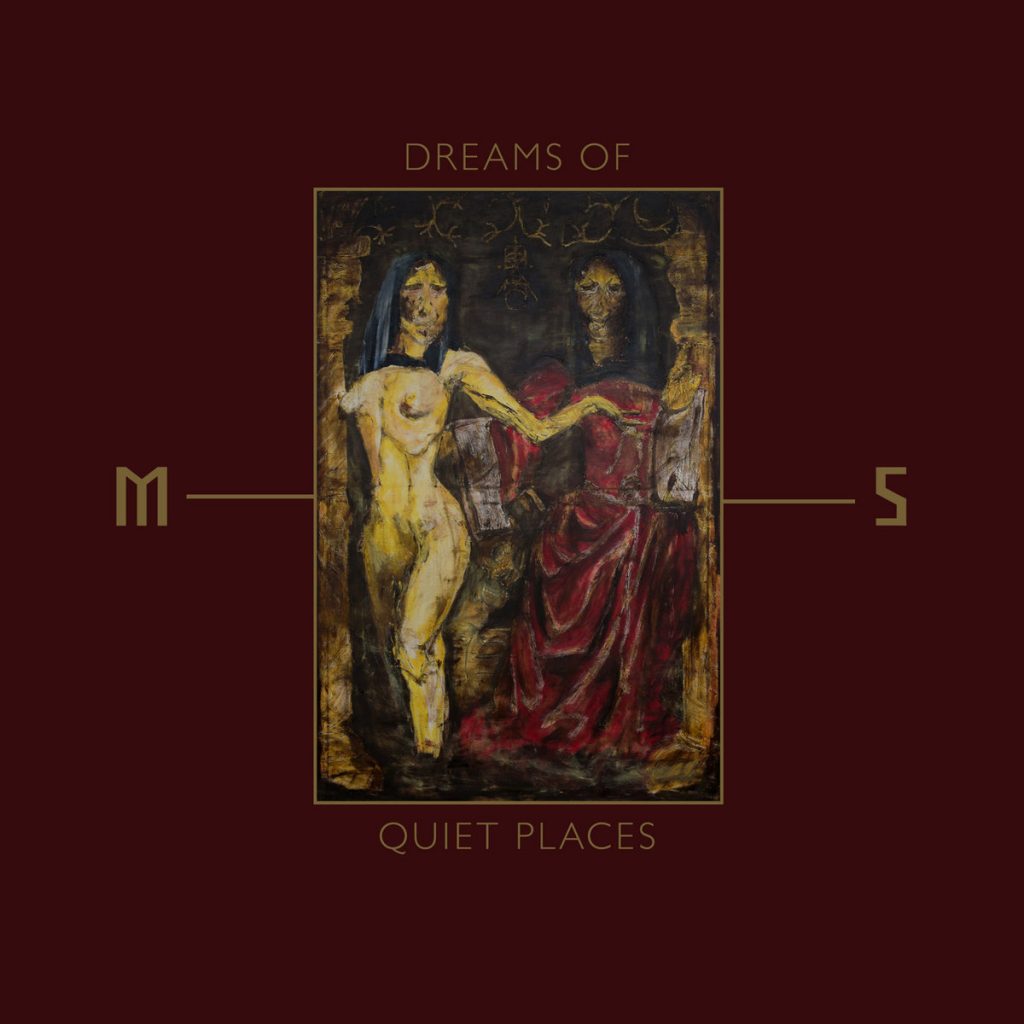Dreams of Quiet Places – A Polish Black Metal Gem
by amy – April 19, 2019 in Music

Mord’a’Stigmata‘s fifth studio album Dreams of Quiet Places grabbed my attention when its elegantly designed, esoteric cover and intriguing title showed up on my Instagram feed, accompanied by the compelling description offered by @calligraphed.sins:
“Polish infused black metal…a thoroughingly modern and forward thinking album of blackened musical landscapes…depth and subtance…dissonance and melody.”
Sold.
As it played through in my headphones for the first time, I was intrigued. The intro on the first track, Between Walls of Glass, builds a gentle, enigmatic atmosphere in a calm space. Then, craftfully, the drums and the guitars enter to add consecutive layers until at a certain point, the song launches into full gear with powerful force. Across the album, this band excels at clever builds and a controlled release of a strong, momentous energy that sustains. Your attention never has a chance to stray from beginning to end of this 44-minute release.
Sonically, this Polish group creates a mid-paced, dynamic black metal with depth and intention. Further than that description, they are rather difficult to place in a box genre-wise. It can be said that they sit on the shoulders of traditional black metal and that they incorporate some of the complex layering and esoteric sounds of orthodox black metal in the cult French and Swedish circles, but unlike those bands, Mord’a’Stigmata expresses less madness and chaos. They choose a much less frantic, less idealogical assault, and neither do they try to be grim or cult. There are no unhinged vocals or raw, hypnotic blastbeats flogging you into Satanic ecstasy. No, this band is more calculating, grounded, and multidimensional, taking a different path into the void that somehow turns out to be just as pummeling as more extreme forms of black metal.
The music is driven by impressive drumming that is fresh, tight and creative. The cymbal work is bright and refreshing, as well as the well-timed changes that drive and evolve the songs. They use clean, harmonized guitars to construct thick atmospheres that the vocals launch out of, which are a deep, gutteral onslaught. Keyboards are used tastefully at times to create atmosphere. They draw out interesting progressions on guitar with weight and seriousness, often with a detuned, depressive tone, and from the maelstrom they construct, negative emotions are then unleashed: depression, fear, psychosis, detachment. Though the words are mostly unintelligble, the lyrics fit the depressive theme and reflect a detachment from the world, an exploration of the void. This exploration, in their words and in their sound, is the way they achieve catharsis. It’s beautifully done.
It is difficult and perhaps disrespectful to try to relate this band to others as they create music on their own terms, but in terms of production, atmosphere and delivery, I could point out similarities with occult/orthodox black metal acts Mgła, Blaze of Perdition (also Polish), and Altar of Plagues. They recall Glorior Belli at times with their meaty mid-tempo riffs and vocals. There is an element of occult experimentalism as was offered us once upon a time on Secrets of the Moon‘s Carved in Stigmata Wounds and Bergraven‘s Dödsvisioner. I also think of the little-known gem of an album, Skullreader by one-man act Sun of the Blind. But perhaps a stronger resonance can be found in contemporary Polish extreme acts Furia and Morowe. Mord’a’Stigmata could thus be part of a broader movement that indicates Poland’s innovation on the black metal front. To paraphrase a reviewer on Encylopaedia Metallum, Polish black metal could be the fourth wave of black metal.
Diverse styles seem to ocassionally surface in the music in a subtle, seamless way. Sometimes there is an aggressive death metal vibe to the vocals. There is a detuned, dangerous-sounding guitar riff on The Stain that sounds straight out of early Converge. The song Spirit of Crystal has definite gothic tones with the help of keyboards and the deep, clean vocals sounding almost Tiamat-ish. These different sounds are not surprising when you learn that the band’s varied musical tastes include Portishead, The Cure, Depeche Mode, Pink Floyd, Aphex Twin, Swans and Neurosis. They are inspired by artists that have done truly original things in music, and they look to do the same themselves.
Mord’a’Stigmata is a diamond in the rough, something new to pick out of the oversaturated world of black metal for those that seek it.
